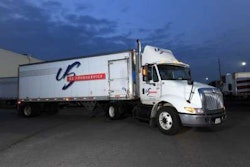GE Asset Intelligence, a business of GE Capital, announced that its GE VeriWise Trailer Tracking and Refrigerated Trailer Monitoring systems have been approved as ecomagination products after completing GE’s rigorous Ecomagination Product Review (“EPR”) process.
By providing up to the minute location and status information, as well as exception management reporting, VeriWise reduces wasted mileage and refrigerated trailer fuel consumption. VeriWise was conceived as a GE Imagination Breakthrough as a tool to support a wide variety of industries in monitoring, managing, and optimizing the use of remote assets to generate improved return on investment.
The VeriWise system provides numerous operational efficiencies to trucking companies, including reducing wasted miles, and therefore, reducing fuel use and CO2 emissions, the company says. The carbon avoidance potential is also substantial for refrigerated trailers using diesel fuel to run their cooling units. With the timely information and management reports available with VeriWise, a 1,000-trailer refrigerated carrier could avoid between 500 and 1,700 metric tons of CO2 emissions annually, roughly the same amount absorbed by 135 to 460 acres of southeastern U.S. forest, the company says.
“The operational benefits of our VeriWise product are well established – trucking companies can carry the same volume of freight with fewer trailers,” says Darryl Miller, COO of GE Asset Intelligence.
According to the American Trucking Association, the trucking industry consumed 53.9 billion gallons of fuel in 2006. At an EPA estimated 22.2 pounds of CO2 emissions per gallon of diesel fuel burned, this accounts for almost 543 million metric tons of CO2 emitted annually. With the 1 to 2 percent reductions in fuel burn typical of companies effectively using GE VeriWise trailer tracking, the industry could avoid between 5.5 and 11 million metric tons of CO2 emissions each year – about the same amount absorbed by a southeastern U.S. forest between 1.5 and 3 million acres, the company says.










